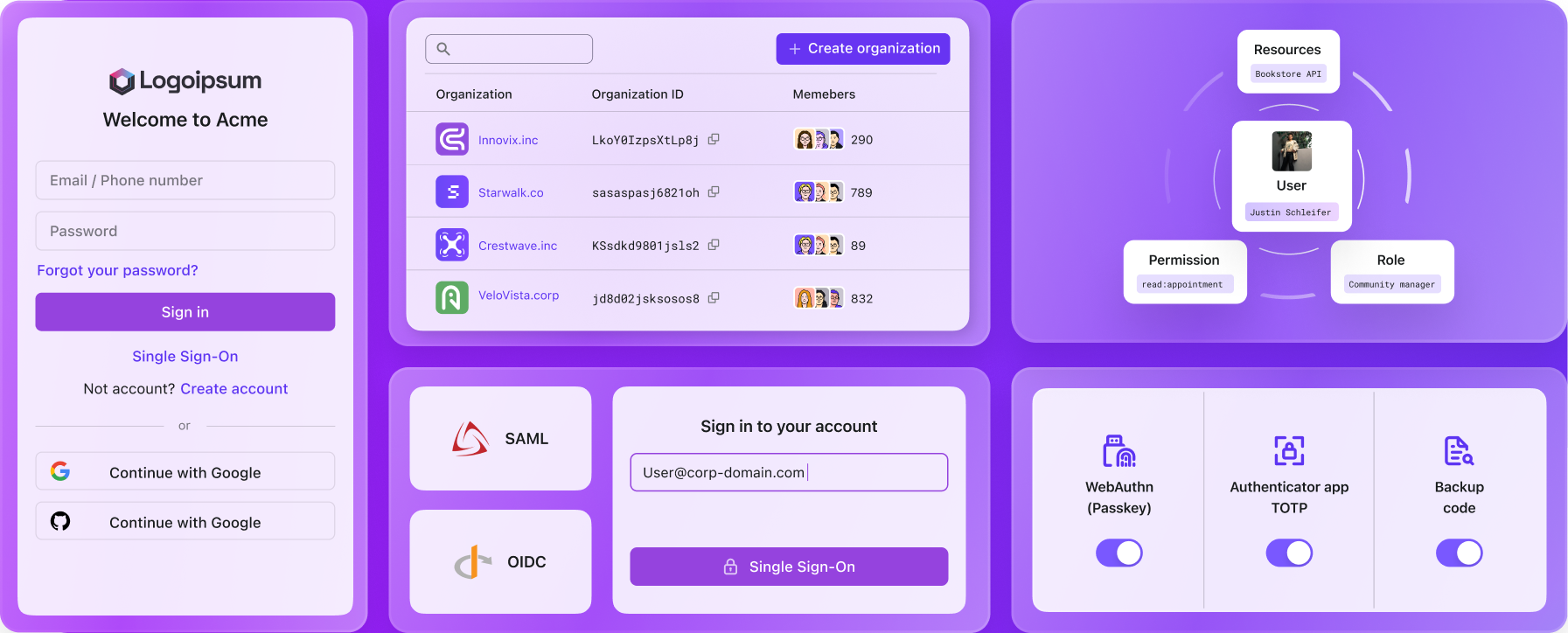2025 Auth0's latest pricing explained and the best Auth0 alternatives
Auth0 has updated its pricing twice within a year. This article provides an overview and breaks down the key details. It covers what Auth0 is, a summary of its pricing, and the best alternatives to Auth0.
What is Auth0
Auth0, founded in 2013, is a cloud platform that provides developers with tools to easily add authentication and identity management to their applications. It was later acquired by Okta, a company specializing in workforce identity management.
What’s cool about Auth0 is that it sticks to open-standard protocols like OAuth 2.0, OIDC, and SAML. It uses OAuth 2.0 and OpenID Connect for user authentication and authorization. Auth0 supports various flows for APIs and applications, simplifying implementation so users don’t need to worry about the technical details of OIDC or OAuth 2.0 specifications.
OIDC flows supported by Auth0
Not all authentication providers fully respect or prioritize open standards. Being open standards-compliant is important because it ensures systems, applications, and tools can work together without any issues, enabling interoperability regardless of the technology stack. It also provides flexibility, allowing businesses to switch providers or integrate with other systems without being locked into a single vendor. As mentioned, Auth0 supports typical OIDC flows
- Authorization code flow: Used by server-side applications for secure token exchange.
- Implicit flow (with Form Post): Simplifies token handling for single-page apps but is less secure.
- Hybrid flow: Combines elements of authorization code and implicit flows.
- Device authorization flow: Designed for devices with limited input, like smart TVs.
- Client credentials flow: For server-to-server communication without user involvement.
Key authentication and authorization feature supported by Auth0
Now let’s dive into the core functionality and key authentication features Auth0 offers:
- Basic authentication options like email, phone, username, social logins, and custom UI.
- Multi-factor authentication (MFA).
- Role-based access control (RBAC).
- Enterprise Single Sign-On (SSO).
- Organization support for multi-tenant applications.
- API and SDK support.
These requirements are essential for building both B2C and B2B products, and feature availability is a critical factor for all authentication providers.
What is Auth0 pricing
Auth0’s pricing can be tricky to navigate, and buyers often prefer a quick summary of key points to compare features easily when selecting an authentication provider.
Here are the main highlights of Auth0 pricing we summarized:
- Pricing is divided into B2C and B2B models.
- Both yearly and monthly payment options are available, with the yearly plan offering one free month.
- Auth0 uses a MAU (Monthly Active User) usage-based billing system, with plans capped at certain MAU limits.
- Most features are similar across B2C and B2B plans, but key differences include:
- SSO availability: Enterprise SSO is unavailable in B2C plans (except for unlimited Okta connections).
- The number of organizations supported: B2B allows unlimited organizations, while B2C has a limit.
Auth0 Free Plan
Here are some notable highlights of the Free plan for both B2B and B2C:
- 25,000 MAU
- Custom domain is available, which needs credit card verification required for custom domains. It must be some growth techniques for sales and product teams to identify qualified leads.
- 1 Auth0 dashboard tenant and 3 collaborators
- 5 organisations
- No multi-factor authentication (MFA)
- No role-based access control
This plan is perfect for:
- Personal projects and small startups at the early stage
- Less security and access control needs but just want to set up the basic authentication
Auth0 Essential and Pro plan
There’s no major difference between Auth0’s Essential and Pro plans. Here’s a breakdown of the differences:
- Custom Database Connections
- Cros-app SSO
- Pro forms
- Enhanced password protection
- Basic breached password detection
- Enterprise MFA
- More tenant and collaborators
- 5 days longer retention and additional log streaming
After comparing the Essential and Pro plans, you’ll see there aren’t many differences, but the MAU price doubles in the Pro plan! The Pro plan is better suited for companies with a tighter budget and fewer advanced security needs.
Auth0 Enterprise plan
The Enterprise plan starts when MAU exceeds 20k in the Pro plan, 30k in the Essential plan for B2C, or 10k in B2B plans. The enterprise plan includes advanced, enterprise-only features such as:
- Machine-to-machine access to organization
- Home realm discovery
- Long lived session
- Credential guard
- Bot detection
- Adaptive MFA
- Continuous session protection
- HIPPA/BBA
- OIDC back-channel log out
- 99.9%SLA
- Private deployment
- Premier support
If you look into this, you’ll see that Auth0’s Enterprise Plan offers advanced services, enhanced security features, and support for a larger number of MAUs. However, many customers have shared concerns that Auth0’s paid plans have low MAU limits, forcing them to upgrade to the Enterprise Plan too quickly.
Auth0 Startup Plan
As we’ve discussed, Auth0 tends to push customers to the Enterprise plan quickly, and the overall costs are quite high. To address these concerns, Auth0 offers a startup plan to make its pricing more accessible and attract more users.
- The startup plan is free for one year.
- Includes 100k Monthly Active Users.
- Offers 5 Enterprise Connections.
- Includes all features from the B2B Professional plan, including Enterprise MFA.
This plan is great for early-stage startups wanting to integrate authentication on a limited budget. However, it’s uncertain what the costs will be after the first year or which SKUs Auth0 may require for upgrades.
Auth0 cost breakdown
To make pricing easier to understand at a glance, we’ve created this data table instead of relying on a potentially misleading slider. Bold
Auth0 B2C plan
| MAU | Essential | Pro |
|---|---|---|
| 500 | $35/mo | $240/mo |
| 1000 | $70/mo | $240/mo |
| 2500 | $175/mo | $545/mo |
| 5000 | $350/mo | $1000/mo |
| 7500 | $525/mo | $1200/mo |
| 10000 | $700/mo | $1600/mo |
| 20000 | $1400/mo | Get in touch |
| 30000+ | Get in touch | Get in touch |
Auth0 B2B plan
| MAU | Essential | Pro |
|---|---|---|
| 500 | $150/mo | $800/mo |
| 1000 | $300/mo | $800/mo |
| 2500 | $700/mo | $1200/mo |
| 5000 | $1300/mo | $1500/mo |
| 7500 | $1725/mo | $1800/mo |
| 10000 | Get in touch | Get in touch |
| 20000 | Get in touch | Get in touch |
| 30000+ | Get in touch | Get in touch |
As shown in this detailed comparison, if you have B2B requirements, you’ll quickly be pushed toward the Enterprise Plan! You can easily match your MAU to the table to quickly see how your pricing will change.
When to use Auth0 and its pros and cons?
Auth0 is a reliable, professional product built on open standards. Choose Auth0 if:
- You’re a large enterprise with complex security, customization, and support needs.
- Budget isn’t a concern, as Auth0’s MAU-capped pricing can be expensive.
Avoid Auth0 if:
- You’re an early-stage SaaS startup, especially in AI. Auth0’s pricing scales up quickly as MAUs grow, this is inevitable in the AI era and AI products often require multi-tenant architecture in the future.
- You need role-based access control (RBAC) for B2B products, as Auth0 doesn’t support this by default in the Free plan. Its support for only 5 organizations in Free plans is limiting for B2B SaaS.
- You prefer open-source solutions or want to avoid vendor lock-in.
- You need a simpler solution for general developers, as Auth0 can be complex to implement.
What are Auth0 alternatives in the market and how’s their pricing?
Ory is an open-source authentication product but comes with high costs and an open-core model. For 10,000 users, pricing ranges from $1,249 to $1,595 per month, which can be a significant challenge for developers.
Clerk focuses on Next.js but lacks SDKs and examples for other languages. It doesn’t strictly follow OIDC standards, which can lead to integration issues and challenges in being enterprise-ready. It’s also closed-source and expensive. The cap is 10,000 MAUs, but it charges $100 for MFA and $1 per active organization beyond the 100-organization limit.
WorkOS specializes in Enterprise SSO, charging $125 per month per SAML connection. If your business doesn’t require scalable enterprise SSO, WorkOS could be a viable option.
Stytch scales costs quickly. It caps at 10,000 MAUs, but once you grow to 12,000, the cost jumps to $400, and at 15,000 MAU, it’s $1,000. This even doesn’t include the additional $99 branding removal fee, which adds to your monthly total.
Logto as an Auth0 alternative
Here we would like to recommend Logto as an open-source authentication product with 9k stars on GitHub, meaning no vendor lock-in. Here are its key benefits:
- The free plan includes role-based access control and custom domains.
- Supports over 30 popular frameworks.
- Strictly adheres to open standards like OIDC, OAuth, and SAML. It supports the common flows we discussed earlier in this article.
- Free plan includes 50k MAUs and 100k tokens in the free plan. The Pro plan provides unlimited MAUs and 100k tokens.
- Suitable for developers, early-stage startups, and enterprises.
- Covers almost all authentication features and matches Auth0 in functionality, including MFA, enterprise SSO (SAML and OIDC), organizations, and more.
- Logto also offers cost advantages:
- MFA is $48/month.
- Organizations are $48/month for unlimited organizations, with no extra charges for active organizations.
- Enterprise SSO is $48 per connection, significantly cheaper than WorkOS.
- The Pro plan includes many features that Auth0 offers only in its Enterprise plan, such as back-channel logout and machine-to-machine organization access.
If you’re frustrated with Auth0’s complicated pricing, save this article—we’ll keep you updated with the latest news about Auth0.
If you’re planning to migrate to Logto, we provide direct human support to ensure a smooth transition. We’ll help protect your users and ensure long-term stability.

